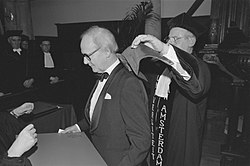Frank Kermode Quote
The degree of rigidity is a matter of profound interest in the study of literary fictions. As an extreme case you will find some novel, probably contemporary with yourself, in which the departure from a basic paradigm, the peripeteia in the sense I am now giving it, seems to begin with the first sentence. The schematic expectations of the reader are discouraged immediately. Since by definition one seeks the maximum peripeteia (in this extended sense) in the fiction of one's own time, the best instance I can give is from Alain Robbe-Grillet. He refuses to speak of his 'theory' of the novel; it is the old ones who talk about the need for plot, character, and so forth, who have the theories. And without them one can achieve a new realism, and a narrative in which 'le temps se trouve coupé de la temporalité. Il ne coule plus.' And so we have a novel in which,. the reader will find none of the gratification to be had from sham temporality, sham causality, falsely certain description, clear story. The new novel 'repeats itself, bisects itself, modifies itself, contradicts itself, without even accumulating enough bulk to constitute a past--and thus a story, in the traditional sense of the word.' The reader is not offered easy satisfactions, but a challenge to creative co-operation.
The degree of rigidity is a matter of profound interest in the study of literary fictions. As an extreme case you will find some novel, probably contemporary with yourself, in which the departure from a basic paradigm, the peripeteia in the sense I am now giving it, seems to begin with the first sentence. The schematic expectations of the reader are discouraged immediately. Since by definition one seeks the maximum peripeteia (in this extended sense) in the fiction of one's own time, the best instance I can give is from Alain Robbe-Grillet. He refuses to speak of his 'theory' of the novel; it is the old ones who talk about the need for plot, character, and so forth, who have the theories. And without them one can achieve a new realism, and a narrative in which 'le temps se trouve coupé de la temporalité. Il ne coule plus.' And so we have a novel in which,. the reader will find none of the gratification to be had from sham temporality, sham causality, falsely certain description, clear story. The new novel 'repeats itself, bisects itself, modifies itself, contradicts itself, without even accumulating enough bulk to constitute a past--and thus a story, in the traditional sense of the word.' The reader is not offered easy satisfactions, but a challenge to creative co-operation.
Related Quotes
They took one look at me,And hated my black face.They took one look at me,And decided on my fate.They took one look at me,And forced an unknown fear.They took one look at me,And caused the shed of tea...
About Frank Kermode
He was the Lord Northcliffe Professor of Modern English Literature at University College London and the King Edward VII Professor of English Literature at Cambridge University.
Kermode was known for many works of criticism, and also as editor of the popular Fontana Modern Masters series of introductions to modern thinkers. He was a regular contributor to the London Review of Books and The New York Review of Books.
